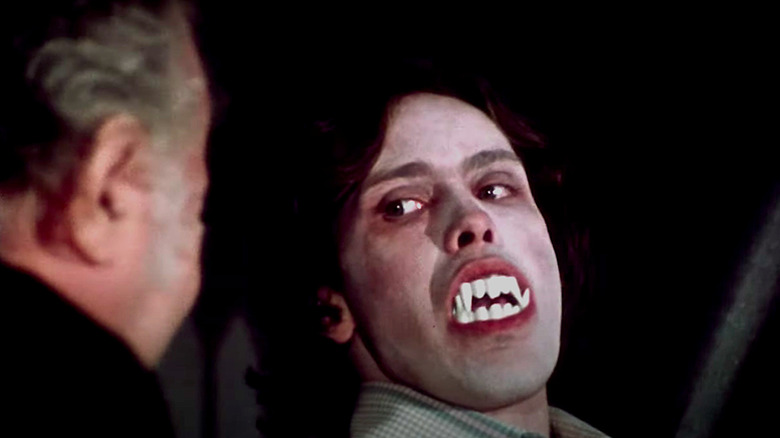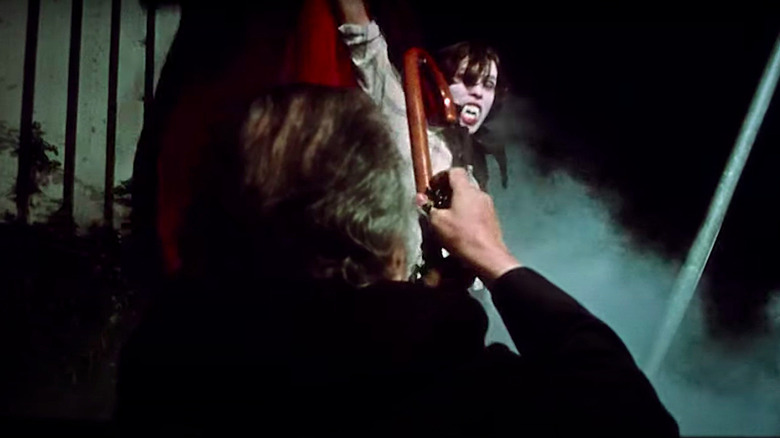Year Of The Vampire: George A. Romero's Martin Might Just Be An Incel Prototype
(Welcome to Year of the Vampire, a series examining the greatest, strangest, and sometimes overlooked vampire movies of all time in honor of "Nosferatu," which turns 100 this year.)
It's impossible to talk about horror movies without mentioning George A. Romero. He's written and directed some of the genre's most influential and beloved films, and in many ways, to be a horror fan is to be a fan of Romero and his impressive body of work. His "Night of the Living Dead" series is probably his most well-known films, but his other works like "Creepshow" and "Knightriders" have also proven themselves to be classics. What sets Romero apart from many of the horror writers and directors of his time is his strong commitment to social justice, so skilled is he at using violence and fear to shed light on humanity's flaws.
One of Romero's infrequently discussed but exceptionally great films is the 1977 flick "Martin." Romero has repeatedly said that "Martin" is his favorite of his films, and it's not hard to understand why. "Martin" tells the story of a young man named, you guessed it, Martin. He comes to live with his elderly cousin in Pennsylvania, but he harbors a dark secret. He believes himself to be a vampire, and in order to quench his thirst for human blood, he stalks, drugs, rapes, and eventually kills women that he meets. During these encounters, he is always sure to cut their wrists and drink their blood before leaving them to die.
"Martin" is a strange film in that visually, there isn't much about it that feels like a horror movie. Set in sunny, albeit depressing, Braddock, Pennsylvania, at times the film feels more like a demented coming-of-age story. Romero takes care to present Martin, who truly is a monster, in a sympathetic way, and when he begins calling in to a radio show to talk to the DJ about his predilection for female blood, viewers are both repulsed by his nonchalance, but perhaps also a little sympathetic to his loneliness and inability to communicate successfully. Oftentimes the movie feels slow and quiet, but it quickly shakes you out of a false sense of complacency as soon as Martin decides to take another victim. These scenes can be difficult to watch, but they are effective in their message and tone. Ultimately, "Martin" is a strange vampire film that seeks to uproot the traditional tropes of the vampire in order to say something larger about life and the male ego.
What It Brought To the Genre
In many ways, "Martin" is a vampire film that isn't really about vampires. No one in the film is actually thirsty for blood in the true, Hollywood sense of the word. Martin's elderly cousin Tateh Cuda does believe his family is plagued by a vampiric curse that has been passed down from generation to generation, but the movie almost goes as far as to make fun of typical vampire lore and Cuda's reliance on it. When Cuda tries to control Martin — whom he refers to as "Nosferatu" — his cloves of garlic and plethora of crosses do nothing to harm or dissuade Martin from doing whatever he pleases. Occasionally, Martin experiences flashbacks (or hallucinations) to a time period when he truly was a vampire and his cousin was trying to kill him, but these scenes are not examples of real life. In the real world, Martin tells Cuda that "things only seem to be magic. There is no real magic. There's no real magic ever."
What sets "Martin" apart from other vampire movies is its startling lack of the very magic Martin talks about. What is thought of as a vampire in this film is really nothing more than a term used to describe a young man's horrific mental state. The only power he gains from sucking the blood of his female victims is a literal power over their bodies and their lives. Unlike a vampire, he does not need their actual blood to survive, but he does feel he needs to drug and murder women in order to feed his biological need for sex and companionship. By deciding not to make Martin an actual vampire, Romero pushes the genre of the vampire movie forward in an extremely literal way. He forces us to think about our relationship to the word "vampire" in a way that is perhaps a bit more realistic to the human condition. A vampire is no longer just a monster to be feared. Rather, it can be anyone looking to overpower and dominate others. No thirst for blood actually necessary.
Is Martin the Original Incel?
There are many ways to read "Martin." Some see it as a commentary on loneliness while others pick up on its themes of working class struggles during the time period. These concepts are both present within the film, but when watching "Martin," one can't help but feel like the movie and the character of Martin bears a remarkable resemblance to the infamous incels of the 21st century.
In a piece for Split Tooth Media, Bennett Glace shines a light on the idea that Martin is really just an early prototype of the incel personality we are all too familiar with today. Incels, which is short for "involuntarily celibate," are, as Grace describes them, "mostly white, sexually frustrated, performatively heterosexual men [who] meet [online] to degrade women, decry relationships and declare their own commitment to rage, resentment and — eventually — violence." While Martin isn't exactly participating in heated Reddit discussions, there is no denying that his behavior and his beliefs bare a remarkable resemblance to the incel way of life. He, a white, sexually frustrated, heterosexual male, and clearly exhibits a complete and total inability to interact with people in a healthy and normal way. He struggles to speak to anyone who talks to him, and when he does manage to interact, his personality is awkward and uncomfortable. These poor communication skills coupled with his inability to cope with his own emotions and desires ultimately alienate him, allowing him to create the belief that in order to fulfill his desires, he must forcibly take them.
Now, Romero really had no way of knowing what an incel was all the way back in the late '70s, but the fact that "Martin" can be read as an early representation of this toxic personality is telling. And while Martin doesn't exhibit every incel trait — he does tell his victims that he doesn't want to hurt them, leading us to believe that hatred for women isn't really what's driving him — he does seem to firmly believe that sex and female companionship is somehow owed to him, so much so that he feels it's alright to take it without permission. He strips the women in the film — with the exception of Abbie Santini who willingly welcomes a sexual relationship with him — of their right to consent, and if that's not vampiric, I don't know what is.


